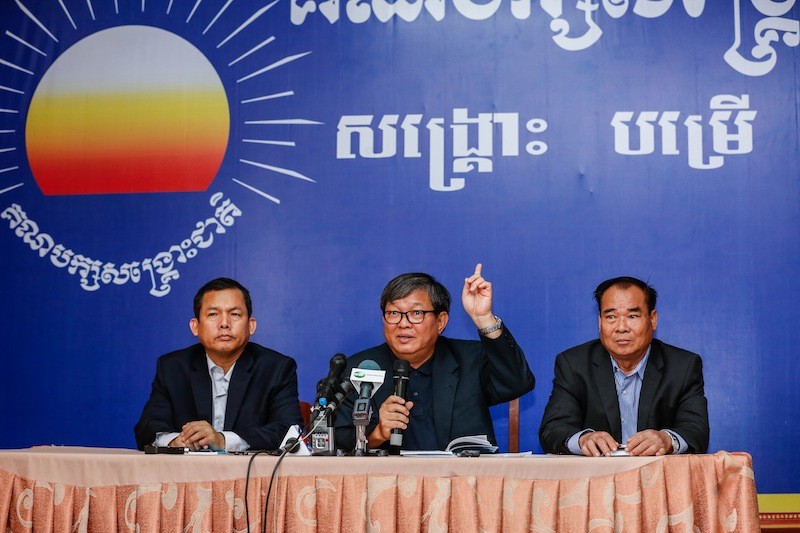The opposition softened the conditions of its boycott of the National Assembly on Tuesday, retreating from its demand that the government drop a court case that has led to the criminal conviction of CNRP Vice President Kem Sokha.
The tone of compromise over the monthslong boycott, which began after police attempted to arrest Mr. Sokha on May 27, appeared to narrow the chasm that had opened between Cambodia’s two main parties, even as political tension has been rising.

Amid the jailing of senior opposition figures, military exercises conducted around CNRP headquarters, threats of mass anti-government demonstrations and Prime Minister Hun Sen’s vow to “eliminate” opponents who carry out such protests, the CNRP on Tuesday said talks were the only way forward.
Speaking to reporters outside Phnom Penh’s Prey Sar Prison—where 18 opposition politicians are jailed—CNRP lawmaker Son Chhay said the party was now willing to end its boycott of parliament if the ruling party agreed to reconsider recently passed laws on the judiciary and summon four government ministers for questioning.
“It has reached the point where there is no choice between the two big parties but to talk,” Mr. Chhay said.
On Monday, in the same speech that Mr. Hun Sen threatened to “eliminate” those who dared to demonstrate against his government, he said that he would be “a dog” if he sat down for negotiations given the current situation, saying “the only place to talk is the National Assembly.”
Mr. Chhay said he saw Mr. Hun Sen’s words as a signal that both sides were ready to come together. “Samdech Prime Minister said he wants to talk,” he said.
Earlier this week, Mr. Chhay—a senior member of the opposition who often leads negotiations with the CPP—laid down a very different party line when defending their threats to hold mass demonstrations. “Sometimes there needs to be someone to shake them to wake them up and force them to do the right thing,” he said on Monday.
Just last month, Mr. Chhay said the party would not consider joining sessions of parliament unless the courts stopped pursuing Mr. Sokha. “I think if they can stop bothering our acting president, we can still consider going back to work within the parliament,” he said on August 25.
The CNRP’s boycott of the National Assembly has seen mixed success, with Mr. Hun Sen frequently mocking the opposition for refusing to go to work, and even independent political observers saying the opposition would benefit from engaging in parliamentary politics.
Since last year, the CNRP has made it a priority to amend laws they say cement provisions that threaten judicial independence by allowing executive overreach into court administration. They are targeting the Law on the Organization of the Courts, the Law on the Status of Judges and Prosecutors, and the Law on the Organization and Functioning of the Supreme Council, all passed in 2014.
The CNRP’s proposed amendments to the three laws are currently before the National Assembly’s CPP-controlled permanent committee, which meets next Wednesday. The CNRP wants those amendments passed in committee and put on the agenda of the entire Assembly ahead of its next plenary session, which opens next month, Mr. Chhay said.
He added that the four ministers the CNRP wants to question are Justice Minister Ang Vong Vathana, over court irregularities as well as links to a shady offshore company revealed in the “Panama Papers”; Defense Minister Tea Banh, for allowing the military to make overtly political statements; Agriculture Minister Veng Sakhon, over low rice prices that are throttling farmers’ livelihoods; and Health Minister Mam Bunheng, whom the CNRP wants to impeach over mismanagement of the country’s health care system.
Sok Eysan, a spokesman for the CPP, flatly rejected the CNRP’s proposals.
“The CPP will not be held hostage by the CNRP,” Mr. Eysan said.
“After it threatened a mass demonstration, now they’re making threats over amending the law,” he said. “There’s no need to amend those laws because they are working smoothly.”
The opposition, which holds 55 out of 123 seats in parliament, would not be able to pass the amendments on its own anyway, he added. “For amending a law you need two-thirds—they don’t have enough voices.”
Leng Peng Long, a spokesman for the National Assembly, confirmed he had received a letter from the CNRP and sent it to the assembly’s permanent committee for review.
In his latest dismissal of international concern over the country’s darkening political climate, Mr. Hun Sen told visiting Japanese diplomats and politicians during the opening of a hospital in Phnom Penh that the perceptions were a big misunderstanding.
To illustrate the point, he offered a joke about a company boss and his secretary.
The boss’s wife, suspecting that her husband has had an affair, beats him up over a text message from the secretary saying, “Boss, I’m pregnant.” She assaults her husband again upon seeing a text in which the secretary says she will notify her parents the next day. Finally, the wife reads a third text, which explains that the secretary is asking for leave so she can go meet her boyfriend’s family.
“By the time the fact was revealed, he got three stitches,” Mr. Hun Sen said. “Cambodia’s situation is like this. So don’t rush to conclusions.”
(Additional reporting by Kuch Naren)